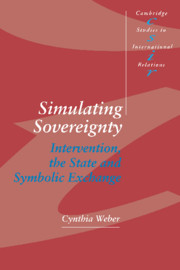Book contents
- Frontmatter
- Contents
- Preface
- Acknowledgments
- 1 Writing the state
- 2 Examining the sovereignty/intervention boundary
- 3 Interpretive approaches
- 4 Concert of Europe interventions in Spain and Naples
- 5 Wilson Administration actions in the Mexican and Bolshevik revolutions
- 6 United States invasions of Grenada and Panama
- 7 Symbolic exchange and the state
- Notes
- References
- Index
- Titles in the series
6 - United States invasions of Grenada and Panama
Published online by Cambridge University Press: 30 September 2009
- Frontmatter
- Contents
- Preface
- Acknowledgments
- 1 Writing the state
- 2 Examining the sovereignty/intervention boundary
- 3 Interpretive approaches
- 4 Concert of Europe interventions in Spain and Naples
- 5 Wilson Administration actions in the Mexican and Bolshevik revolutions
- 6 United States invasions of Grenada and Panama
- 7 Symbolic exchange and the state
- Notes
- References
- Index
- Titles in the series
Summary
… it seems to me people ought to recognize where this request came from…
Secretary of State George Shultz,
regarding the Organization of Eastern Caribbean States
request for US military assistance in Grenada
United States intervention discourse since the Wilson era has made reference to a similar set of claims. No matter where US military action takes place, the US maintains that its action does not constitute “intervention” nor violate the sovereignty of the target state because a discursive distinction has been drawn between a repressive government with no legitimate claim to sovereign authority and the people of the target state who are sovereign.
When confronted with the meanings of sovereignty, intervention, and the people circulating in Reagan–Bush Administration discourse concerning Grenada and Panama, it is no simple proposition to trace these meanings back to the Wilson Administration. While recalling all the significant themes of the Wilson Administration – self-determination, democracy, anti–autocracy – the Reagan–Bush Administration discourse encounters difficulties in locating the origins of these themes and their meanings. As during the Wilson era, the foundation of sovereign authority remains the people. However, an answer to the question “who are the people?” cannot be found until one first answers another question, “which international or region community is represented as the center of judgment about who the sovereign Grenadian and Panamanian people are?”
Reagan Administration discourse represents the Organization of Eastern Caribbean States (OECS) – a small regional organization – as the community of judgment about foundational meanings like sovereignty, intervention, and the people. Bush Administration discourse on the Panama invasion is interwoven with Bush Administration discourse on the War on Drugs.
- Type
- Chapter
- Information
- Simulating SovereigntyIntervention, the State and Symbolic Exchange, pp. 92 - 122Publisher: Cambridge University PressPrint publication year: 1994

